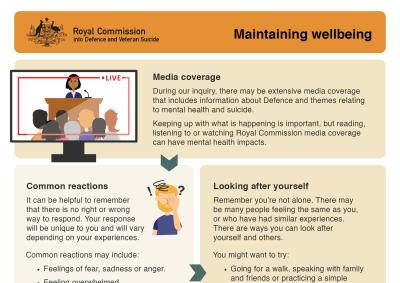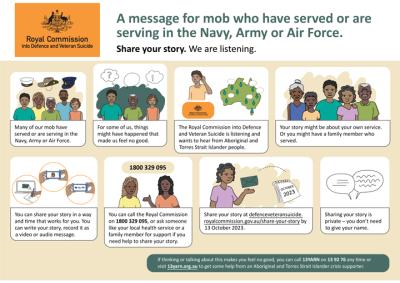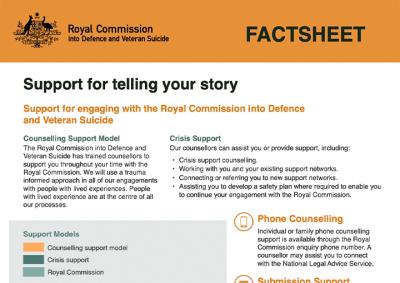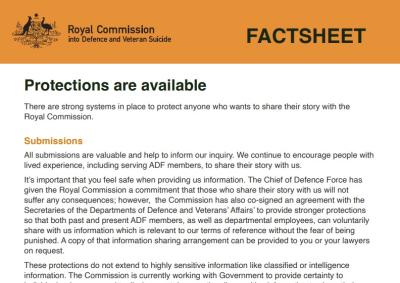Resources
The Royal Commission into Defence and Veteran Suicide has created a number of resources to assist community members and stakeholders in engaging with the Royal Commission. These resources can be downloaded and shared.
Please note: Submissions to the Royal Commission closed on 13 October 2023. Some of the information in the resources on this page relating to submissions may no longer be relevant.
The Commissioners and Royal Commission staff would like to thank everyone who has made a submission. Your stories are valuable and have helped inform our inquiry.
Videos
What are the terms of reference?
Video Transcript – Terms of reference
The terms of reference outline what the Royal Commission is looking into as part of its inquiry
They are deliberately broad and cover issues that may contribute to serving and ex-serving
Defence member suicide – such as mental health and wellbeing, claims, support services,
rehabilitation, and social or family contexts.
If your experience relates to any of the these, the Royal Commission wants to hear your story.
When you make a submission, you will be asked to select at least one of the terms of reference.
You can select one or more that you think apply to your experience.
For example: If you struggled during training or deployment
and were not able to continue your career in the Defence force this would relate to
the terms of reference point B. If you found that support services you and
your family needed were inaccessible or ineffective this would relate to points B, D and F.
If your mental health was impacted by financial strain or insecure housing this would relate
to point I. And If your submission is about what helped
you after a lived experience of suicide this would related to point E.
Pick the terms of reference that you think best fits with your story – it doesn't
need to exactly match and you might find that more than one apply.
You can pick the ones you feel most comfortable with.
Your story does not need to relate directly to suicide to make a submission.
If you are unsure which of the terms of reference your story relates to, we can help.
You can find the full terms of reference on our website, and we also have a simplified
How to share your story and what support is available
Video Transcript – How to share your story and what support is available
Have you or one of your mob served in the Defence Force?
Do you have a story about something that wasn't right that you want to share?
The Royal Commission into Defence and Veteran Suicide is listening and wants to hear from Aboriginal and Torres Strait Islander people about serving in the Navy, Army or Air Force.
Your story might be about your own service or about a family member.
You can share your story in a way and at a time that works for you.
This could include writing your story or recording it as a video or audio message.
You can send it to the Royal Commission through their website at defenceveteransuicide.royalcommission.gov.au or email it to dvsrc.enquiries@royalcommission.gov.au
Sharing your story is safe and private. You don't need to give your name.
There's still lots of time to get ready to share your story.
You can send it to the Royal Commission any time before October 2023.
If you need help to share your story, you can call the Royal Commission on 1800 329 095 or ask someone like your local health service for support.
If thinking or talking about this makes you feel no good, you can call 13 Yarn or 13 92 76 any time or visit 13yarn.org.au to get some help from an Aboriginal and Torres Strait Islander crisis supporter.
What the Royal Commission is and why it's important
Video Transcript – What the Royal Commission is and why it's important
Many of our mob have served or are serving in the Navy, Army or Air Force.
For some of us, things might have happened that made us feel no good or worried.
A Royal Commission into Defence and Veteran Suicide is happening now.
The Royal Commission is a group of people, the Commissioners, who are listening to people around the country about what has happened to them in the Navy, Army or Air Force.
They also want to hear from family who have been affected.
It could be about suicide or it might be about mental health, recruitment, or how you felt when you left the service.
Sharing your story could help improve mental health and help stop suicide among people in the Defence Force. It can help other Aboriginal and Torres Strait Islander people by creating a safer future for people in the Navy, Army or Air Force.
To find out how you can share your story with the Royal Commission, call 1800 329 095 or visit defenceveteransuicide.royalcommission.gov.au
If thinking or talking about this makes you feel no good, you can call 13 Yarn or 13 92 76 or visit 13yarn.org.au to get some help from an Aboriginal and Torres Strait Islander crisis supporter.
Commissioner Nick Kaldas - Protections available
Video Transcript – Commissioner Nick Kaldas (Protections available)
We want to hear from serving and former-serving members about life in the ADF, especially as it relates to well-being and risks of suicide.
The Chief of Defence, General Angus Campbell, was unequivocal in his evidence last week that there will be no consequences, whatsoever, for any former or current-serving member, who provides relevant information to the Royal Commission.
I want to make it clear, that it is a criminal offence under the Royal Commission's Act to inflict ANY disadvantage on ANY person for giving evidence to the Royal Commission.
In addition, any evidence provided to the Royal Commission cannot be used against that person in any Civil or Criminal Court proceedings, except for offences against the Royal Commission Act itself.
The Royal Commission has strong protections and can keep information confidential, including the identity of people who wish to remain anonymous.
Protections available
Video Transcript – Protections for people engaging with the Royal Commission
We've heard some current and ex-serving members and their families are unsure about sharing their very personal stories with the Royal Commission.
Whether it's about life in the ADF or their experience with the Department of Veterans Affairs.
We understand your concerns, but we want to assure you that there are very strong systems in place to protect people who want to provide information to us.
We Commissioners have recently signed an information sharing agreement with the Chief of Defence and the secretaries of the Departments of Defence and DVA.
It further strengthens the legal protections available to current and ex-serving members, as well as current and former Defence and DVA employees who wish to speak to us about their experience at work or while performing official duties.
The agreement ensures you can talk to us about these experiences, and as long as it's relevant to our terms of reference, you can't be penalised for doing so.
If you're worried about providing information to the Royal Commission, you can request a copy of this agreement from us so you and your lawyers can review the details.
There are other protections that are specifically related to giving evidence and responding to notices to provide information to the Commission.
It's a criminal offence to injure a person for giving information to or appearing before a Royal Commission. It's also illegal for your employer to fire or dismiss you for engaging with us.
If you are threatened in any way about speaking to the Royal Commission please let us know.
If you give evidence at a public or private hearing or private session nothing you say to the Royal Commission can be used against you in any civil or criminal court proceedings.
And remember, if you'd like to make a submission, you can remain anonymous.
The information you share in a private session is protected by statute, by law, and will be kept confidential unless you give consent for it to be shared.
If you have any questions or concerns about sharing information with the Royal Commission, we strongly encourage you to seek legal advice.
You may have your own lawyer or you can get in touch with the Defence and Veterans Legal Service, a free, independent national service for those wishing to engage with the Royal Commission.
We are aware that people need to feel safe to engage with the Royal Commission and we continue to work with the government to look at how we can protect people who may want to disclose information that might be considered operationally sensitive.
In most cases, it's not necessary for people to disclose operationally sensitive information when sharing their stories about suicide and suicidality.
We will continue to focus our efforts to make sure people that come forward to share with the Royal Commission are protected.
This is your chance to tell your story and help make a difference.









